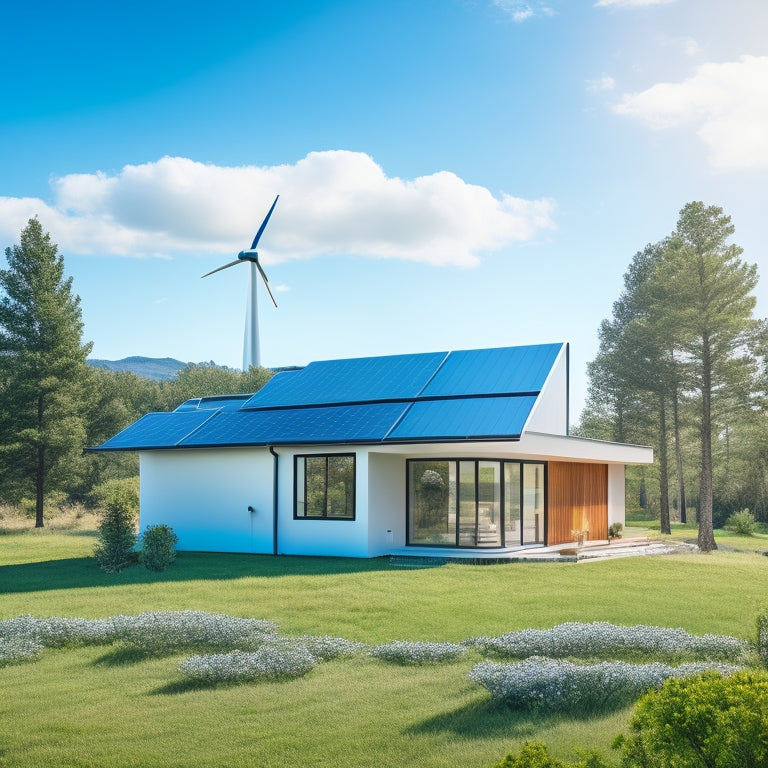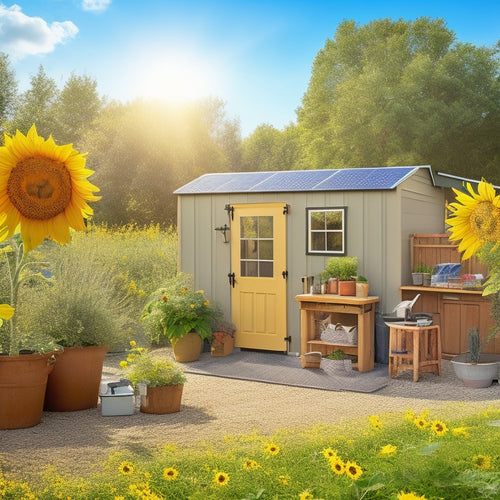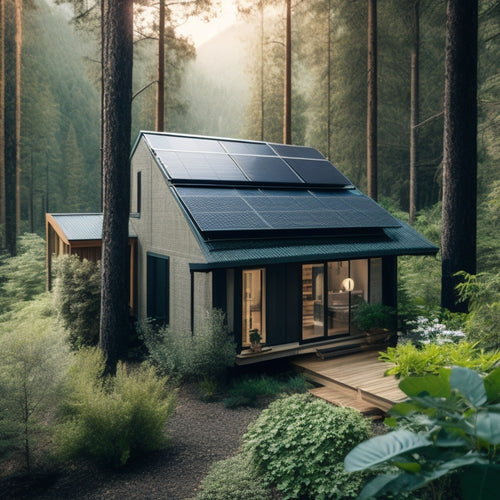
Affordable Home Energy Independence Made Easy
Share
You can now achieve affordable home energy independence with the latest advancements in off-grid technology, which have made it possible to generate, store, and use clean energy at a lower cost than ever before. Key elements include efficient solar panels, a reliable inverter, and a robust charge controller. When choosing an off-grid system, conduct an energy audit, consider system sizing, and evaluate quality, warranty, and maintenance needs. With cost-effective solar kits, DIY installation options, and affordable brands, you're one step closer to grid-free living. As you explore your options, you'll discover even more ways to simplify your path to energy independence.
Key Takeaways
• Conduct an energy audit to determine your energy requirements and choose the right off-grid system for your home.
• Look for cost-effective solar kits and consider DIY installation to save on upfront costs.
• Choose scalable and upgradable systems to ensure consistent and reliable energy supply.
• Advancements in technology have decreased the cost of off-grid energy solutions, making energy autonomy accessible.
• Consider energy storage options with high cycle life and efficient battery management systems for long-term reliability.
Solar Panel Kit Essentials
When selecting a solar panel kit, you'll need to make sure it includes several essential components that work together to convert sunlight into usable electricity.
A high-quality solar panel kit should include efficient solar panels, an inverter, a charge controller, and a mounting system. The solar panels convert sunlight into DC power, which is then converted to AC power by the inverter. The charge controller regulates the flow of energy to your battery bank, ensuring ideal energy storage.
Proper Solar Panel Maintenance is vital to ensure the longevity of your system and maintain Energy Efficiency. Regular cleaning of the panels and monitoring of the system's performance can greatly impact the overall energy output. Look for a kit that includes a monitoring system to track your energy production and identify any potential issues.
Choosing the Right Off-Grid System
You'll need to carefully select an off-grid system that's tailored to your specific energy needs and budget, guaranteeing a reliable and efficient energy supply. To do this, it's vital to conduct an energy audit to determine your energy requirements. This involves evaluating your energy usage patterns, including the type and number of appliances, lighting, and heating/cooling systems.
Next, you'll need to contemplate system sizing, which involves calculating the size of the solar panel array, battery bank, and inverter required to meet your energy needs. A well-designed system will ensure that you have a consistent and reliable energy supply.
When choosing an off-grid system, take into account factors such as the quality of components, warranty, and maintenance requirements. It's also critical to evaluate the system's expandability and upgradability to accommodate future energy needs.
Cheap Off-Grid Solar Panel Options
When aiming for affordable home energy independence, you'll want to explore cheap off-grid solar panel options that won't break the bank.
You can start by examining cost-effective solar kits that bundle essential components at a lower cost, or opt for DIY installation to save on labor costs.
Additionally, you can look into budget-friendly brands that offer reliable solar panels at a lower price point without compromising on quality.
Cost-Effective Solar Kits
With a growing demand for off-grid energy solutions, cost-effective solar kits have emerged as a viable alternative to traditional solar panel installations, offering a more affordable path to energy independence. These kits are designed to provide a smooth shift to renewable energy, minimizing your reliance on the grid. You can now harness the power of the sun to reduce your energy bills and environmental footprint.
Here are some cost-effective solar kit options to think about:
| Kit Type | Power Output (W) | Energy Savings (kWh/yr) | Environmental Impact (CO2 reduction, lbs/yr) |
|---|---|---|---|
| Starter Kit | 100 | 120 | 240 |
| Premium Kit | 500 | 600 | 1200 |
| Pro Kit | 1000 | 1200 | 2400 |
These kits are designed to be scalable, allowing you to start small and expand as needed. With energy savings of up to 1200 kWh per year and a significant reduction in CO2 emissions, you'll be doing your part for the environment while saving money on your energy bills. By choosing a cost-effective solar kit, you're taking a significant step towards energy independence and a more sustainable future.
DIY Installation Options
By opting for a DIY installation, you can significantly reduce the upfront costs associated with off-grid solar panel systems, making it an appealing option for those looking to achieve affordable energy independence. This approach allows you to take control of your energy future, and with the right guidance, you can successfully install a personalized system that meets your specific energy needs.
Before you begin, conducting thorough home inspections is vital to determine the ideal placement and configuration of your solar panels. This will guarantee that your system operates at maximum efficiency.
When designing your DIY installation, keep the following key considerations in mind:
- Assess your energy consumption patterns to determine the required system size
- Evaluate your roof's structural integrity to support the weight of the solar panels
- Ensure compliance with local building codes and regulations
- Plan for adequate energy storage solutions, such as batteries, to provide backup power during outages or periods of low sunlight
Budget-Friendly Brands
You can opt for budget-friendly brands that offer affordable off-grid solar panel options without compromising on quality, making it possible to achieve energy independence without breaking the bank. These brands provide a cost-effective way to harness solar energy, reducing your reliance on the grid and increasing your energy savings. When comparing brands, consider factors such as panel efficiency, warranty, and durability.
Here's a comparison of some budget-friendly brands:
| Brand | Panel Efficiency | Warranty | Price Range |
|---|---|---|---|
| Renogy | 18.5% | 25 years | $200-$500 |
| HQST | 19.5% | 25 years | $250-$600 |
| WindyNation | 20.5% | 25 years | $300-$700 |
| Eco-Worthy | 21.5% | 25 years | $350-$800 |
| Anker | 22.5% | 25 years | $400-$900 |
These brands offer a range of options for different budgets and energy needs. By choosing a budget-friendly brand, you can achieve energy independence without breaking the bank. With the right brand, you can start enjoying energy savings and reducing your carbon footprint.
Online Market for Solar Accessories
Online retailers and specialized marketplaces now offer a vast array of solar accessories, allowing homeowners to easily source the components they need to customize and optimize their solar energy systems. This shift in market trends has made it easier for you to find the perfect accessories for your solar setup. With online platforms like Amazon and eBay, you can browse through a vast product variety, read customer reviews, and make informed purchasing decisions.
Some benefits of shopping online for solar accessories include:
- Access to a wide range of products from various brands
- Convenience of shopping from the comfort of your own home
- Ability to read reviews and ratings from other customers
- Option to compare prices and find the best deals
When shopping online, be sure to check the shipping options, return policies, and warranty claims of the seller. You can also leverage online forums, social media, and educational resources to stay updated on the latest market trends and product developments. By taking advantage of these online resources, you can make informed decisions and optimize your solar energy system for maximum efficiency.
Key Features of Off-Grid Batteries
When choosing off-grid batteries, it's crucial to take into account several key features that affect their performance, longevity, and overall value.
You'll want to contemplate the battery's chemistry, as different types offer varying levels of energy density. For instance, lithium-ion batteries boast high energy density, making them ideal for compact off-grid systems.
You should also factor in the depth of discharge (DOD), which affects battery longevity. A higher DOD means you can use more of the battery's capacity, but it may reduce its lifespan.
Look for batteries with a high cycle life, which measures how many charge/discharge cycles it can handle before capacity drops. A higher cycle life translates to longer battery longevity.
Additionally, take into account the battery management system (BMS), which protects the battery from overcharging, over-discharging, and overheating. A reliable BMS ensures your off-grid system operates safely and efficiently.
Easy Installation Made Possible
As you consider moving towards off-grid energy independence, you might be worried about the complexity of installation. Fortunately, most off-grid battery systems are designed with simplicity in mind, featuring plug-and-play architecture that enables seamless integration with existing systems. This streamlined process guarantees that you can get up and running quickly and efficiently.
The efficient design of these systems makes installation a breeze. Here are just a few benefits you can expect:
-
Pre-assembled components: Many systems come with pre-assembled components, reducing the time and effort required for installation.
-
Modular design: Modular designs allow for easy expansion and customization, making it easy to adapt to your energy needs.
-
Intuitive monitoring systems: User-friendly monitoring systems provide real-time insights into your energy production and consumption.
- Minimal wiring and cabling: Simplified wiring and cabling reduce the risk of errors and make maintenance a snap.
With an off-grid battery system, you can enjoy the benefits of energy independence without the hassle of complicated installation. Say goodbye to the grid and hello to a more efficient, streamlined energy solution.
Grid-Free Living at Affordable Prices
You can now enjoy the freedom of grid-free living without breaking the bank, thanks to the decreasing cost of off-grid energy solutions. With the advancement in technology, it's become more accessible to achieve energy autonomy and self-sufficiency.
You can now generate your own clean energy, store it, and use it when needed, reducing your reliance on the grid. This shift towards energy independence not only saves you money but also reduces your carbon footprint.
Off-grid energy solutions, such as solar panels and energy storage systems, have become more affordable, making it possible for you to take control of your energy needs. You can now power your home, farm, or business with clean energy, reducing your reliance on the grid.
With the decreasing cost of energy storage, you can store excess energy generated during the day for use at night or during power outages. This means you can enjoy the freedom of grid-free living without sacrificing convenience or breaking the bank.
Frequently Asked Questions
How Long Does It Take to Pay off the Cost of Solar Panels?
"Did you know that solar panels can increase your home's value by up to $15,000? You'll break even on your solar panel investment in 5-7 years, achieving Energy Freedom and enjoying Solar Savings of around $500 annually, depending on your location and energy usage."
Can I Install Solar Panels on a Rented Property?
You'll need to review your rental contract's lease terms and discuss with your landlord to make sure you're not violating property restrictions; securing a landlord agreement is essential to install solar panels on a rented property.
Are Off-Grid Solar Systems Suitable for Small Homes?
"You think a small home means limited energy options? Think again! Off-grid solar systems are perfect for small spaces, offering energy efficiency, home automation, and renewable energy. You can thrive in a tiny, tech-savvy haven."
Do Solar Panels Work Efficiently in Cold Climates?
You might wonder if solar panels work efficiently in cold climates. Rest assured, winter performance remains stable due to increased electrical conductivity at low temperatures. Snow reflection can even boost energy output by up to 10%!
Can I Expand My Off-Grid Solar System in the Future?
You can easily expand your off-grid solar system in the future by planning for system upgrades and energy scalability from the start, ensuring a smooth shift to increased energy demands.
Related Posts
-

Is This the Future of Alternative Energy Systems
Yes, alternative energy systems are shaping the future of energy. Innovations in solar and wind technologies are driv...
-

Building an Emergency Backup Solar Power System in 5 Essential Steps
Building an emergency backup solar power system involves five key steps. First, assess your daily energy needs to ide...
-

Off Grid Solar Batteries
As you shift to off-grid living, you'll rely on high-performance solar batteries to store excess energy generated by ...


